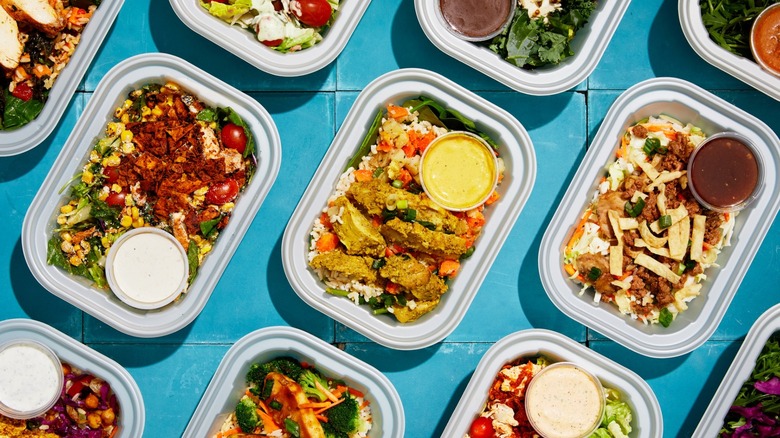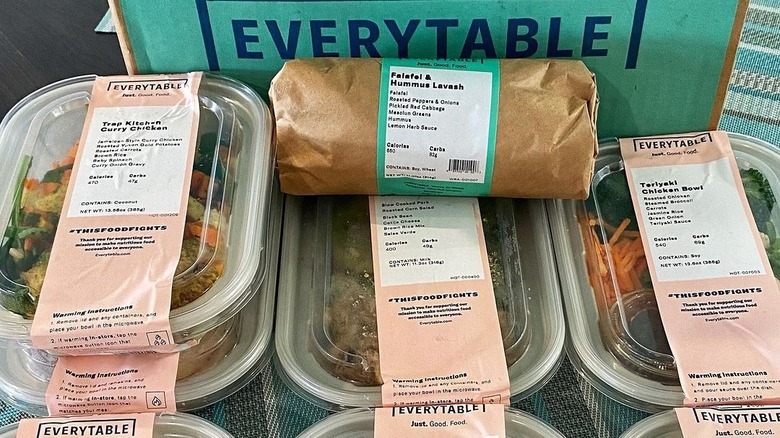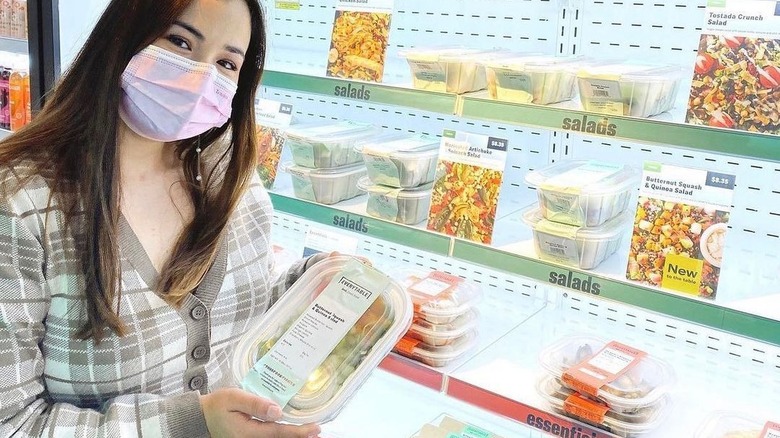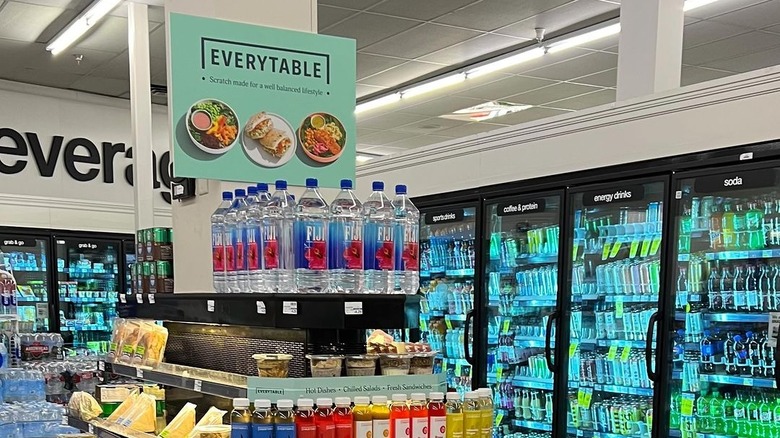Everytable: Here's What Happened After Shark Tank
There's a reason why fast food is so popular no matter where you are in the world: It's not just tasty — it's also cheap and, for some, an affordable source of sustenance. A 2013 analysis published in BMJ Journals reviewed 27 studies from 10 countries to find that healthy food costs $1.50 more per person every day, or a total of $550 each year. Even if one could afford the extra cash, not everyone has access to fresh and nutritious food; according to the USDA, nearly 23.5 million Americans lived in low-income areas with no supermarkets within a one-mile radius in 2016 — areas that are also known as food deserts (via U.S. Department of Health & Human Services). The 23.5 million included 6.5 million children and a massive 11.5 million people with incomes that were 200% below the poverty line.
So, when Sam Polk and David Foster appeared on Season 9, Episode 21 of "Shark Tank" with Everytable, their nutritious food business — which tweaked the prices of its meals according to the area it was catering to and what its residents could afford — seemed like the solution to a very concerning issue. But this wasn't Polk's first attempt at nourishing Americans on a budget: The Los Angeles resident and Columbia graduate left a successful career as a senior trader on Wall Street to start a non-profit called non-profit called Food Education Access Support Together (formerly called Groceryships) in 2013, which provided healthy food to families living in food deserts. There he met his future business partner David Foster and together they launched Everytable in 2015.
What happened to Everytable on Shark Tank
There is only one thing that the Sharks like more than a business that promises lucrative returns on their investment: a business that also tackles a pressing problem. Everytable seemed to have all that was needed to snag a successful "Shark Tank" deal, but the Sharks sensed trouble. The entrepreneurs were hoping to secure $1 million in exchange for a 5% stake in their company, bringing Everytable's valuation to $20 million. Polk and Foster justified the steep valuation with previous funding rounds and an annual run-rate of $2.6 million in revenue from their five LA-based outlets.
However, the entrepreneurs were also burning through $125,000 every month. To add to that, Barbara Corcoran and Lori Greiner both agreed that they didn't see any fire or drive in the entrepreneurs; Robert Herjavec thought that their high valuation left no room for any mistakes that young businesses were bound to make; and Mark Cuban feared that it would be a long time before Everytable would be profitable enough to give him any returns on his investment.
That left only one Shark on the table, Rohan Oza. The guest Shark offered to make an investment at a $7.5 million valuation — but that was less than half of what Polk and Foster originally sought. After a round of nail-biting negotiations, the entrepreneurs agreed to part with 10% of equity in exchange for the million-dollar investment, bringing Oza onboard their nutritious food business.
Everytable after Shark Tank
Before their appearance on the show, Polk and Foster had already raised large amounts in seed funding, $2.1 in a bridge round, and another $5 million in Series A funding. Whether or not the deal between Oza and the Everytable entrepreneurs materialized after the show is unclear, but what is certain is that Polk and Foster looked for more investment after their episode on "Shark Tank" aired.
The duo launched a crowdfunding campaign on Republic in 2018 with the goal of raising up to $1.07 million at a valuation cap of $30 million — though the total amount exceeded the goal three-fold: Everytable raised over $290,000 from 849 investors. The entrepreneurs also secured $2.5 million from The Annenberg Foundation and The California Wellness Foundation through program-related funding in January 2020, as well as another $16 million in Series B funding in November 2020. Sharks aside, Everytable now has the likes of Kimbal Musk, Gwyneth Paltrow, Maria Shriver, and the W.K. Kellogg Foundation as investors to help its affordable nutritious food reach more people.
Everytable is still in business
Everytable is still in business and has grown exponentially since its appearance on "Shark Tank." The entrepreneurs opened the first brick-and-mortar location for Everytable in the food desert area of South L.A. in 2016, quickly expanding to five locations including the upscale communities of Santa Monica and downtown L.A. "The core reason we open in [food deserts] is because we believe healthy food is a human right," Polk admitted to Good, whose goal was to take Everytable to more food deserts in not just Los Angeles — but all across the U.S. At present, Everytable has a total of 55 retail locations in Southern California with five in Orange County and San Diego each, four in Long Beach, and 40 in Los Angeles alone. Everytable has also made its way to the East Coast with 10 locations in New York City.
Polk and Foster have rolled out food subscriptions where ready-to-eat meals are priced between six and eight dollars depending on the area of delivery. The entrepreneurs also design menus for catering and supply their grab-and-go meals to offices and SmartFridges, which are vending machines that work 'round the clock. In fact, according to the company's 2022 impact report, Everytable has installed 60 SmartFridges in 2022 alone and opened 38 stores across the country (of which 36% are in food deserts or areas with low income), selling a total of 5.2 million nutritious meals that year.
What's next for Everytable?
Looking at the company's track record since "Shark Tank," Polk and Foster's goal seems to be to take Everytable beyond its home base in Los Angeles to more localities across the country. The duo is also committed to opening more Everytable outlets in underserved neighborhoods and supplying meals to those in need.
Everytable formed 33 strategic partnerships in 2022, of which 80% are geared towards food-insecure individuals such as seniors, college students, and homeless people. These include a partnership with the City of Los Angeles to home deliver five to 10 meals to 5,500 seniors each week, as well as with non-profit organizations like Volunteers of America to provide a million affordable meals to sheltered and unsheltered individuals. If the past year is any indication, Everytable's future has more than just retail expansion: Polk and Foster are also hoping to increase their social impact.
To fuel this growth, Everytable announced that it had raised $25 million in Series C-2 preferred stock financing in June 2023. The new funding will go towards opening 25 new retail locations in Southern California, New York City, and the Bay Area, bringing more affordable nutritious meals to residents of each region. At the time of its C-2 funding, Everytable had sold a total of 17 million meals since its inception, and considering the fresh injection of funds and the company's history, Polk and Foster have no plans of stopping.





